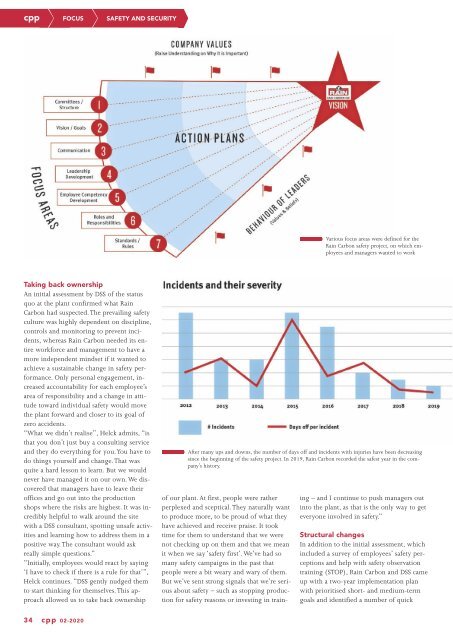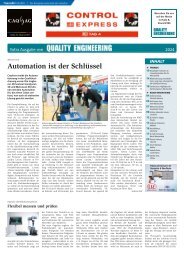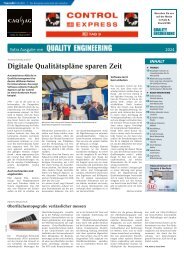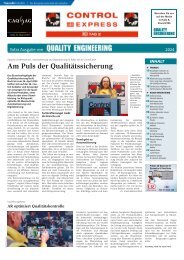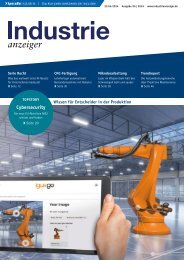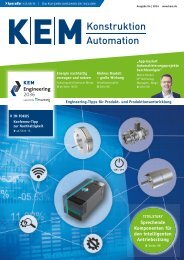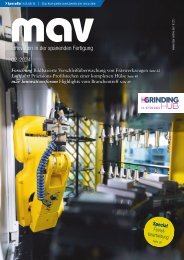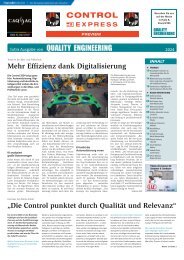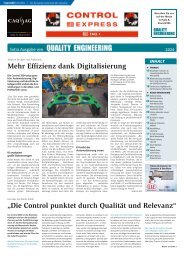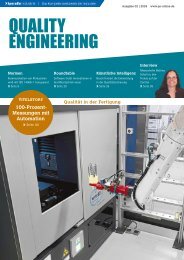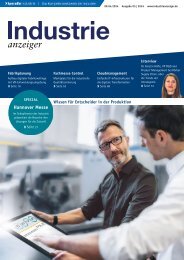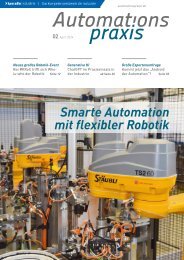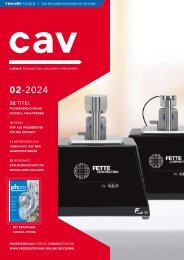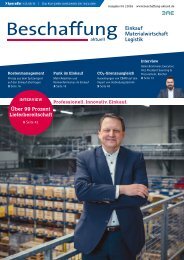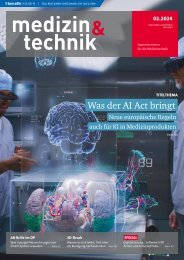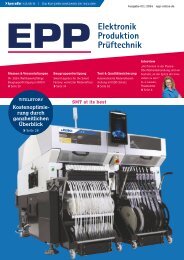cpp – Process technology for the chemical industry 02.2020
The journal cpp - Process technology for the chemical industry reports about processes, plants, apparatus and components for the chemical and pharmaceutical industry. Further topics are IT technologies, industry 4.0, digital production, MSR and automation technology and process analysis technology. The content spectrum is rounded off by explosion protection, plant safety, occupational health and safety, maintenance, site management and energy management.
The journal cpp - Process technology for the chemical industry reports about processes, plants, apparatus and components for the chemical and pharmaceutical industry. Further topics are IT technologies, industry 4.0, digital production, MSR and automation technology and process analysis technology. The content spectrum is rounded off by explosion protection, plant safety, occupational health and safety, maintenance, site management and energy management.
You also want an ePaper? Increase the reach of your titles
YUMPU automatically turns print PDFs into web optimized ePapers that Google loves.
<strong>cpp</strong> FOCUS SAFETY AND SECURITY<br />
Various focus areas were defined <strong>for</strong> <strong>the</strong><br />
Rain Carbon safety project, on which employees<br />
and managers wanted to work<br />
Taking back ownership<br />
An initial assessment by DSS of <strong>the</strong> status<br />
quo at <strong>the</strong> plant confirmed what Rain<br />
Carbon had suspected. The prevailing safety<br />
culture was highly dependent on discipline,<br />
controls and monitoring to prevent incidents,<br />
whereas Rain Carbon needed its entire<br />
work<strong>for</strong>ce and management to have a<br />
more independent mindset if it wanted to<br />
achieve a sustainable change in safety per<strong>for</strong>mance.<br />
Only personal engagement, increased<br />
accountability <strong>for</strong> each employee’s<br />
area of responsibility and a change in attitude<br />
toward individual safety would move<br />
<strong>the</strong> plant <strong>for</strong>ward and closer to its goal of<br />
zero accidents.<br />
“What we didn’t realise”, Helck admits, “is<br />
that you don’t just buy a consulting service<br />
and <strong>the</strong>y do everything <strong>for</strong> you. You have to<br />
do things yourself and change. That was<br />
quite a hard lesson to learn. But we would<br />
never have managed it on our own. We discovered<br />
that managers have to leave <strong>the</strong>ir<br />
offices and go out into <strong>the</strong> production<br />
shops where <strong>the</strong> risks are highest. It was incredibly<br />
helpful to walk around <strong>the</strong> site<br />
with a DSS consultant, spotting unsafe activities<br />
and learning how to address <strong>the</strong>m in a<br />
positive way. The consultant would ask<br />
really simple questions.”<br />
“Initially, employees would react by saying<br />
‘I have to check if <strong>the</strong>re is a rule <strong>for</strong> that’”,<br />
Helck continues. “DSS gently nudged <strong>the</strong>m<br />
to start thinking <strong>for</strong> <strong>the</strong>mselves. This approach<br />
allowed us to take back ownership<br />
After many ups and downs, <strong>the</strong> number of days off and incidents with injuries have been decreasing<br />
since <strong>the</strong> beginning of <strong>the</strong> safety project. In 2019, Rain Carbon recorded <strong>the</strong> safest year in <strong>the</strong> company’s<br />
history.<br />
of our plant. At first, people were ra<strong>the</strong>r<br />
perplexed and sceptical. They naturally want<br />
to produce more, to be proud of what <strong>the</strong>y<br />
have achieved and receive praise. It took<br />
time <strong>for</strong> <strong>the</strong>m to understand that we were<br />
not checking up on <strong>the</strong>m and that we mean<br />
it when we say ‘safety first’. We’ve had so<br />
many safety campaigns in <strong>the</strong> past that<br />
people were a bit weary and wary of <strong>the</strong>m.<br />
But we’ve sent strong signals that we’re serious<br />
about safety <strong>–</strong> such as stopping production<br />
<strong>for</strong> safety reasons or investing in train-<br />
ing <strong>–</strong> and I continue to push managers out<br />
into <strong>the</strong> plant, as that is <strong>the</strong> only way to get<br />
everyone involved in safety.”<br />
Structural changes<br />
In addition to <strong>the</strong> initial assessment, which<br />
included a survey of employees’ safety perceptions<br />
and help with safety observation<br />
training (STOP), Rain Carbon and DSS came<br />
up with a two-year implementation plan<br />
with prioritised short- and medium-term<br />
goals and identified a number of quick<br />
34 <strong>cpp</strong> 02-2020


